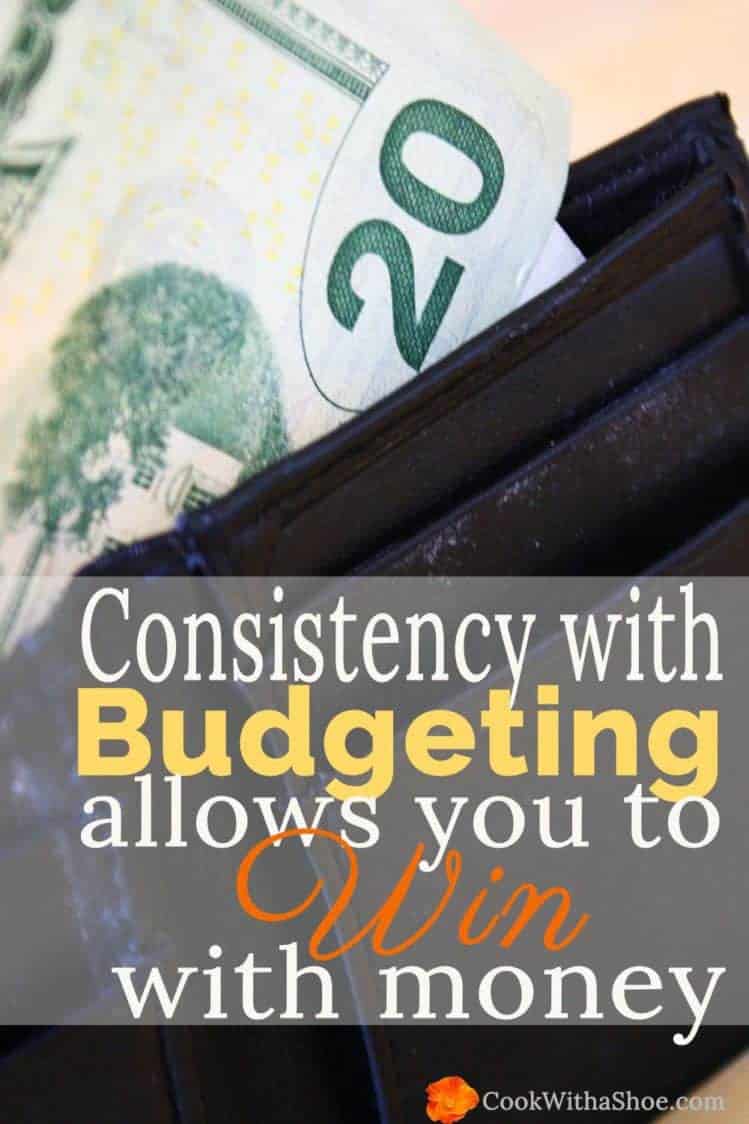Save time and money with my best-selling resources in Complete Change Your Finances Bundle.
Every month brings new expenses and a different set of priorities on where to spend the money. Therefore it is crucial to review the previous month’s budget, see how well you were able to follow it, project any new expenses for the coming month, and reallocate your income dollars if necessary.
Once you have a good idea of your base monthly expenses, it will not take long to see what variable expenses are coming up and the budget changes will be minimal.
[Tweet “Working on a budget monthly does wonders to keeping my financial goals on track. “]
So what does the monthly reviewing and planning process look like for me?
Review last month’s budget
First, I update Quicken. My husband and I write down everything we spend daily in a spiral notebook, regardless of which account, so all of our transactions are together and are then entered into Quicken about once a week. This helps eliminate transactions from being omitted and reduces the time I spend doing data entry making sure the balances match.
I run a quick report to see if there are any areas I may have over or under spent. If I over spent in a couple of categories, I analyze why. Was I being sloppy with following my budget or did something come up I was not expecting? Did I forget to include a necessary expense on last month’s budget?
Dealing with overage and under spending
If the over spending amount is small, I am at a financial place where I can absorb it and move on. However, if there is a lot of overage in a specific category, I may need to rearrange some of the money which should have gone to savings in order to make the budget balance.
On the other hand, when I spend less in a certain category I will do one of three things:
- transfer the leftover amount into savings (or could be used towards debt),
- roll the money into next month decreasing how much is needed for that category,
- or leave the money alone and add the normal amount to it next month.
Honestly, it really depends on the category as to what I will do with the leftover cash. For example, extra money in groceries gets left in that account/envelope since I make periodic bulk purchases of meat and other items whereas leftover money from paying the cell phone bill will get transferred into savings.
Budget forecast
There are times when work was plentiful and there is a lot more money to be had at the end of the month. Yay!
However, I must exercise discipline by dividing the extra money by percentages to go into various savings accounts or I may decide to completely fund an expense that is coming up soon, instead of spending the money just because I have extra.
Once I am all caught up in Quicken and the balances match, I will project how much income is expected over the next month. As a free-lance interpreter, my income is based on how much I work and the hours varies.
[Tweet “Just because you set up a budget once, does not mean you never have to work on it again.”]
At this point, I will revisit my budget with my normal expenses and make sure to include any life events or annual payments happening in the next month. This is also when I will see if I need to cut back any expenses if there is not enough projected income.
I look ahead, is there anything that I need to be saving for long term, provided there is extra money? How much do I need to put aside each month for a long term savings goal and do I need to work more in the weeks ahead to be able to meet my goals?
Budget Meeting
I have put together a working, projected budget and it is time to call a budget meeting with my husband to show him what I have come up with for next month. This meeting is definitely not super formal with lots of excel spreadsheets, agendas or presentations. Ha! If I ran that kind of budget meeting, my husband would revolt!
The meeting lasts about 5-10 minutes on average, where I share the planned, written budget, where we are financially, what next month looks like, if there are any concerns I have or if I need to rearrange money in specific accounts. He is welcome to ask questions and make changes on the budget at this time as he sees fit.
Once there is agreement from both of us on the budget, the meeting is over.We can now work together as a team when we know the financial forecast for the month, where cuts are needed, how much money can be put into savings and when money can be spent based on paydays.
(This post contains affiliate links.)
Monthly budget review
Having a budget on paper for the coming month acts as a guideline on how and when to spend money. On paydays, I will prioritize where the money from the check should go and mark off every item in the budget when it is paid.
If something comes up during the month which is not on our budget, I either rearrange something to cover the expense or if there is a big semi-emergency/unplanned event I will discuss with my husband as to how we need to change the monthly budget to take care of this new expense.
In order to stay on track with your financial goals, it is important to review the previous month and to project ahead for the coming month. You are able to stay knowledgeable about your finances and catch any mistakes or problems immediately.
Committing to reevaluate your budget on a monthly basis ensures that the amount of work and time spent budgeting is manageable instead of putting it off until it becomes a huge, scary mess.
Guilt is not allowed
If last month was a bad month and you did not work on your budget at all, then a new month will give you the opportunity to start again. Take care of what you need to do to close out last month’s spending and move on.
Do not feel guilty or punish yourself by saying “oh I did not save what I wanted to this month so now I have to save that money, plus the money from this month”. That mindset will just make you crazy and lead to stress, believe me I have done it!
Simply rework your budget for the coming month and strive to have better discipline with your spending. When you fail in one area, brush yourself off and get back on track.
Purpose of budgeting monthly
Can working on a budget be monotonous? Well of course. There are always other things that I would rather be doing instead of updating my budget. However, I continue to live on a budget and work on it regularly because I have seen the benefits in my own life.
Budgeting has helped me get out of debt. Additionally, I have been able to invest in my husband’s education and our future through using a budget as a tool. I have enough money to pay all our expenses a the end of the month. I can see exactly where my money has gone when I look at the budget.
Reviewing and projecting the budget monthly is way to continue to stay on the same page and communicate with my husband in the area of finances. Having agreement on finances does eliminate a lot of arguments and gives us a shared goal to work towards.
[Tweet “Consistency with budgeting causes success and allows you to win with money.”]
Are you able to stay on top of your budget on a monthly basis? What frustrations do you struggle with when trying to work on a budget regularly?
Like this post? Check out all the rest in :

Hi! I’m Charissa. I’m on a mission to help hardworking women overcome money struggles and gain financial peace with a Biblical perspective so they can have the freedom to impact their families and communities. Ready to make some changes that will impact your finances in 2020? Click here to get a free worksheet to help you make it happen!






I’ll be the first to admit that we don’t budget in the traditional sense. We do track all our income and spending, though, and we’ve been doing this for about two and a half years (funny coincidence..that’s about the time I started my personal finance blog…). Seeing patterns and having a full understanding of where our money is going has been a huge blessing to us.
DC, thanks for stopping by! Now, I am curious, how do you budget? Blogging about personal finance is certainly a motivator for me to stay on top of my finances too (I don’t want my readers to find out that I am a slacker:-). Once you see where your money is going, that is when you are able to change habits for the better. I definitely saw that to be true in my life.
Wow! Charissa, you spend a lot of time doing budget tasks. I totally agree with what you have written, and the key is to slot out the time as a priority appointment. I find it too easy to get behind on recording my expenses in Quicken, then I have to struggle just to get caught up with that part, let alone actually balancing all the accounts and analyzing them. My goal is to get caught up and to the place of being able to record the receipts daily (even if there is “only one and I can do it tomorrow”.
I definitely DO NOT recommend allowing yourself to get behind by a few weeks (or months :{ I have been there!) as that adds to the stress and allows chaos to control the budget since you don’t have a clue where the money has gone while you are behind.
Great work, Charissa!
Thank you Holly! I do spend a lot of time working my budget, but not always as much as I would like. I have found being consistent and regular with my budget helps me stay on track especially with my variable income and paying for my husband’s schooling.
Getting behind on your budget is a terrible source of stress, I have done that too. Usually I end up entering a miscellaneous expense rather than spending hours trying to figure out where I am out of balance.
Your goal to get caught up and recording the expenses daily sounds like a great goal! Let me know how that goes for you.
My schedule is such I can not enter transactions into Quicken daily, but having a notebook (like a giant register) for any expenses we spend out of any account really helps the data entry go much quicker. I aim for at least 30 minutes a week to sit down and enter the items into Quicken, often I end up spending more time on it than 30 minutes.